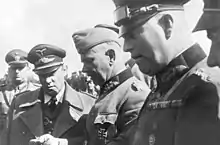Karl Bodenschatz
Karl-Heinrich Bodenschatz (10 December 1890 – 25 August 1979) was a German general who was the adjutant to Manfred von Richthofen in World War I and the liaison officer between Hermann Göring and Adolf Hitler in World War II.
Karl Bodenschatz | |
|---|---|
| Born | 10 December 1890 Rehau, Bavaria, German Empire |
| Died | 25 August 1979 (aged 88) Erlangen, Bavaria, West Germany |
| Allegiance | |
| Service/ | Bavarian Army Luftstreitkräfte Reichsheer Luftwaffe |
| Years of service | 1910–45 |
| Rank | |
| Battles/wars | World War I World War II |
Biography
Early life and First World War
Bodenschatz was born in Rehau, Bavaria; in 1910 he enlisted in the 8th Bavarian Infantry Regiment and was a cadet at the War Academy in Metz until 1912. Following the outbreak of the First World War he saw active infantry service and participated in the Battle of Verdun. After being wounded four times, in 1916 he transferred to the Deutsche Luftstreitkräfte as adjutant to Jagdgeschwader 2 and then Jagdgeschwader 1 as the adjutant to Manfred von Richthofen based at Avesnes-le-sac. In June 1918 Hermann Göring took over command of the squadron after von Richthofen's death.
Between the wars
After the war he joined the Reichswehr as a regular officer and served in the 21st infantry regiment from 1919 until April 1933, he had maintained a friendship with Göring and joined the Luftwaffe as his military adjutant and served in this capacity until 1938, visiting Britain in November 1938.[1]

Second World War
During World War II he was the liaison officer between Hitler's headquarters and the Commander-in-Chief of the Luftwaffe until he was seriously injured in 1944 by the 20 July plot bomb at the Wolf's Lair headquarters in Rastenburg, East Prussia. He was fortunate to survive the explosion as two officers immediately to his left and one to his right were killed.
Post-war
He was captured at Reichenhall on 5 May 1945 and in 1946 was called as a witness at the Nuremberg Trials of major war criminals and served two years in prison. He died in Erlangen in 1979, aged 88.
Medals and honours
- Iron Cross (1914) 2nd and 1st class
- Wound Badge (1918) in Silver
- Aviator badge (Prussia)
- Gallipoli Star ("Iron Crescent", Ottoman Empire)
- Knight's Cross Second Class of the Order of the Zähringer Lion with Swords
- Military Merit Order, 4th Class with swords (Bavaria)
- Golden Party Badge (10 December 1940)
- German Cross in Silver on 30 May 1942 as General der Flieger and chief of Ministeramt in the Reichsluftfahrtministerium with the Oberbefehlshaber der Luftwaffe[2]
- Wound Badge 20 July 1944
- Wehrmacht Long Service Award, 4th to 1st class
- War Merit Cross (1939), 1st class with Swords
- Order of Liberty Cross First Class with Oak Leaves and Swords (Finland)
References
- Citations
- Hansard 28 November 1938
- Patzwall & Scherzer 2001, p. 537.
- Bibliography
- Patzwall, Klaus D.; Scherzer, Veit (2001). Das Deutsche Kreuz 1941 – 1945 Geschichte und Inhaber Band II [The German Cross 1941 – 1945 History and Recipients Volume 2] (in German). Norderstedt, Germany: Verlag Klaus D. Patzwall. ISBN 978-3-931533-45-8.
- Hunting With Richthofen: The Bodenschatz Diaries: Sixteen Months of Battle with J G Freiherr Von Richthofen No. 1. Grub Street, 1998, ISBN 1-898697-97-3.